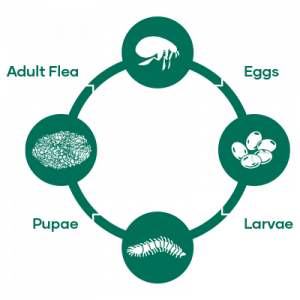Our vets explain what parasites to watch out for and how to keep your best friend protected…
Ask your vet, we are here to help!
Australia is home to some nasty critters, and local knowledge is key. Chat to your local vet team to learn about the parasites that are common in your area. We understand that choosing the right parasite prevention product can be challenging. There are lots of options to choose from and our friendly team is here to help you choose the right product for your pet and lifestyle. Book an appointment now.
Parasites are transmitted in a variety of ways, whether being ingested, bitten or just hopping on board.
In the Australian climate, our pets are at risk of contracting parasites all year round. With different symptoms and dangers, it is important to be aware of the most common forms of parasites.
Paralysis Ticks
Paralysis ticks are small parasites that are found along the East Coast of Australia. Paralysis ticks attach to pets and inject a toxin that causes progressive muscle paralysis. Without prompt treatment, this can be fatal. Sadly many dogs and cats tragically die from tick paralysis in Australia.
Signs of tick paralysis include wobbly back legs, vomiting, lethargy or collapse, difficulty breathing, trouble swallowing or a change in their bark or meow. If you find a tick on your pet it is an emergency, contact your vet immediately for advice. If your regular vet is closed, contact an after-hours emergency vet.
It’s very important to use a tick prevention product to protect your dog or cat. Yes, cats are also susceptible to the paralysis tick. There are preventatives available as there are for dogs. Some tick treatments designed for dogs may be harmful to cats, so always read the label carefully. There are a variety of products available including tasty chews, collars and spot ons.
Vet Tip: Learn how to do a ‘tick search’ on your pet! No treatments are 100% effective so it’s important to conduct a thorough daily tick search of your pet. To learn how to search your pet for ticks, ask your local Greencross Vets.
Ear Mites
Ear mites can cause intense ear irritation and discomfort for your dog or cat. These tiny parasites feed on wax and oils in your pet’s ear canals and can result in scratching around the ears, head and neck, skin irritation, head shaking, the presence of an ear discharge that is dark and waxy (resembling coffee grounds) and an unpleasant odour from the ears.
Ear mites are so tiny that you often can’t spot them with the naked eye. It takes a vet with an otoscope or microscope to properly spot an infestation.
The same species of mite infests both dogs and cats, so they can be transmitted from dog to cat and vice versa. For this reason, treatment of all pets in the household is essential. Oral chews and spot on treatments are available.
Heartworm
If you’ve ever had a mosquito buzzing around you in summertime, you know how annoying they can be! Unfortunately for our pets, mozzies can be not only annoying, but can also infect our pets with deadly heartworm disease. Heartworm is a parasite that is transmitted by mosquitoes and infects both cats and dogs.
As heartworm is carried by mosquitoes, there are certain geographical areas they are more prone than others. The parasite matures in the bloodstream for approximately six months, becomes an adult worm, and then migrates to the heart and the blood vessels of the lungs. Heartworms live in the heart, clogging the vessels leading from the heart.
Dogs often show no obvious signs of heartworm infection in the early stages, but damage to the heart and blood vessels is occurring internally. When damage becomes severe, signs such as coughing, lethargy and difficulty exercising are seen. Heartworm in cats is less common – affected cats can cough, are lethargic but can also suddenly pass away. Not only is heartworm fatal, but treatment for cats and dogs can be complex and costly – so prevention is key.
Vet Tip: Don’t forget about heartworm prevention, it’s important. There are various options to protect your pet from heartworm. For dogs there are tasty monthly chews, spot-on treatments or the convenience of a yearly heartworm injection. For cats, monthly tablets and spot-on treatments are available.

Fleas
If your pet is itching and scratching, they may have fleas! Fleas are small, brown parasitic insects that infest the coat and skin of your pet. Fleas cause itchiness and skin irritation. Some dogs are also highly allergic to flea bites. Fleas can also cause tapeworm infections and in severe cases, anaemia, especially in puppies and kittens.
Fleas breed rapidly, especially in warmer weather. Their lifecycle consists of dormant stages so it’s important to treat all year round. Did you know – a single flea can lay up to 50 eggs per day, so one flea can turn into 20,000 fleas in just 60 days!
Vet Tip: The best way to get rid of fleas is to prevent them in the first place! If your pet already has fleas, you’ll need to treat your pets and home to eradicate all stages of the flea lifecycle. Chat to your local Greencross Vets about the right product for your best friend, and give your pet that fabulous flea-free feeling!

Intestinal worms
Heartworm is often confused with intestinal worms, but they are completely different.
Gastrointestinal or ‘tummy’ worms include hookworms, roundworms, whipworm and tapeworm. Regular worming is an important part of your pet’s healthcare routine. Puppies and kittens need to be wormed every two weeks until they’re three months of age, then every month until they reach six months of age, and finally, depending on the product, every three months for the rest of their life.
It’s important to protect your pet from intestinal worms. Roundworms, hookworms and tapeworms can be transmitted from our pets to human family members.
Vet Tip: Wash your hands! It is important to always follow good hygiene practices around pets. Don’t let your pets lick your face and worm your pets regularly. Chat to your local Greencross Vets to learn more about keeping you and your family safe.

When Can You Start Treatment to Protect Your Pet?
Parasite protection begins as early as 2- 3 weeks with their first deworming. Up until twelve weeks of age, your puppy will need to be wormed every fortnight, then move to monthly until 6 months of age. All dogs should be wormed every three months for optimal protection depending on the product
Tick, flea , worm and heartworm prevention usually begin at 8 weeks old and will need to be re-administered usually every few weeks. Once these first treatments are received, it is important to continue regular check-ups and treatments to ensure your pet stays protected all year round.
Parasite Protection & Prevention FAQs
What Is the Best Flea Treatment for Dogs?
There is a range of flea treatments on the market so you can be sure to find a product for your dog. Greencross Vets can help you find the right product to prevent and protect against these parasites.
Monthly Chewables are a popular treatment and provide protection for weeks at a time.
Shampoo is a convenient way to protect your pet from fleas during their regular routines, but have no residual effect. These products both kill and prevent flea growth and have generally been superseded by other preparations.
Topicals (also known as spot-ons) are applied to the skin over your pet’s back/neck to kill fleas . Worms and heartworm Topicals are available in doses suited for cats and dogs and must be reapplied as per the produce advice. This can vary from 1-6 monthly.
What Is the Best Flea Treatment for Pregnant Dogs?
There is a range of topical and oral flea medications suited for pregnant dogs. Your vet can recommend the right flea treatment for your dog.
What Is the Best Worm Treatment for Dogs?
Deworming treatment is available as an oral medication or a spot-on for dogs. How regularly these products should be given will depend on the product. As a minimum, adult dogs should be dewormed every 3 months. Often products that protect our pets from multiple parasite types, don’t contain tapeworm prevention. Check with your veterinarian if your pet needs an additional tapewormer. Frequency of tapeworming varies with pet lifestyle factors.
Are Oral or Topical Flea Treatments Better?
Both oral and topical flea treatments have been known to effectively protect and treat parasites. Whilst oral medications have been found to be mildly more effective (especially for pets with skin disease such as allergies), it is important to consult with your vet to find which medication will work best for your pet. For example, topical treatments are great if you know your pet struggles to ingest pills.

 Greencross Vets
Greencross Vets 











